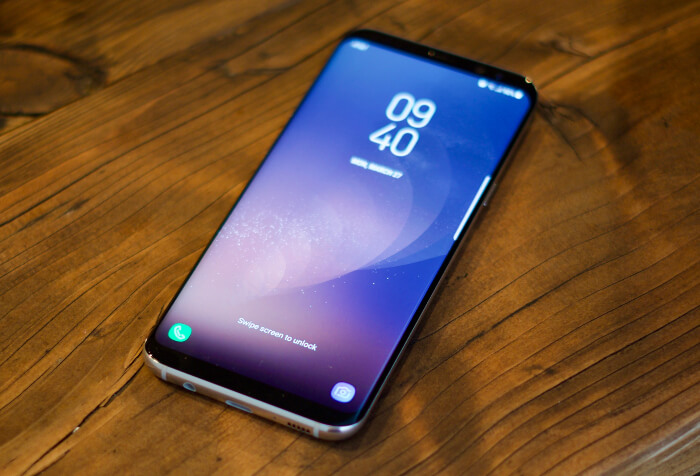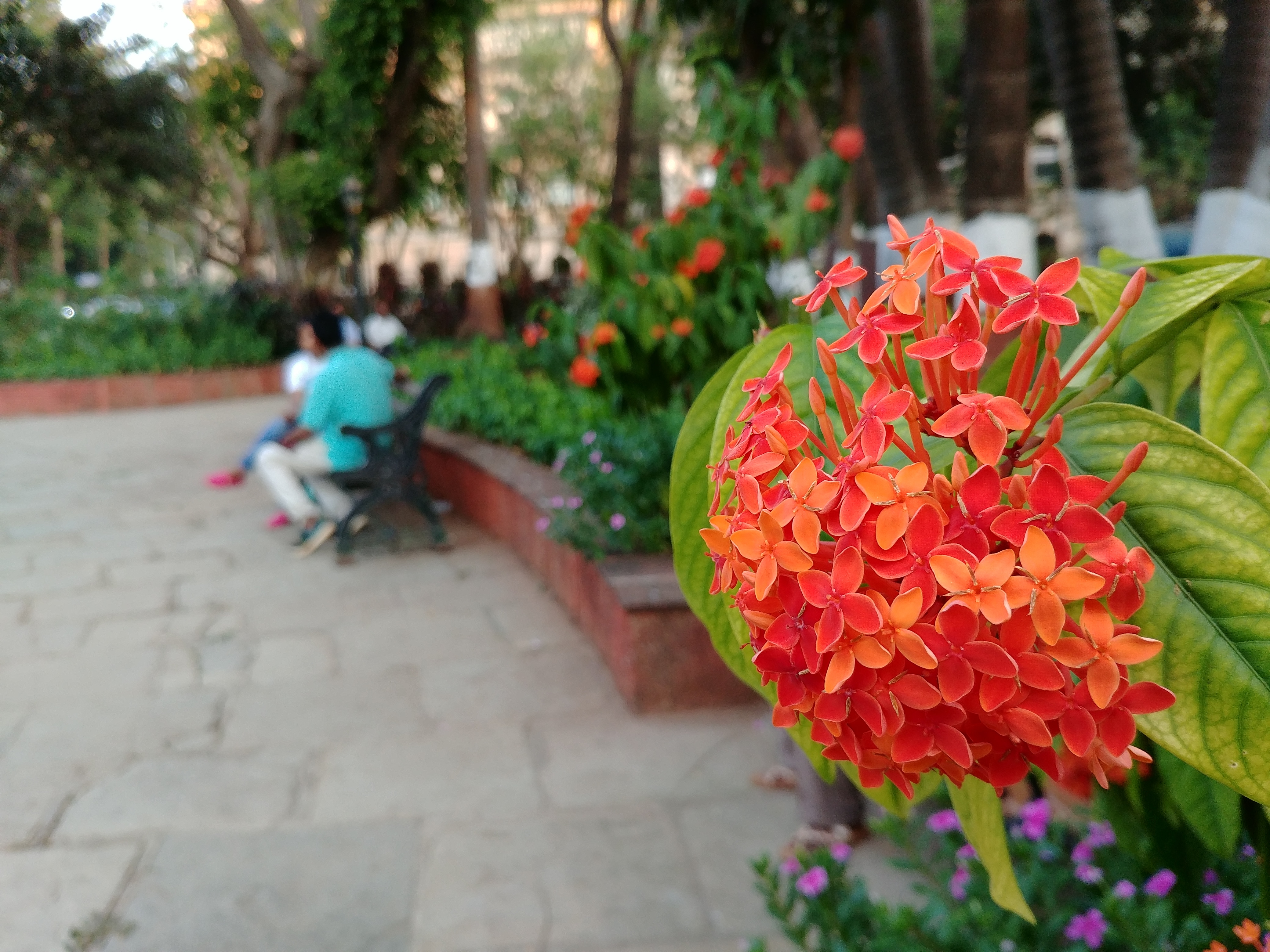
The good news is that the company has moved past the fiasco and is on the right track. To put things in perspective—if Apple iPhone 7 Plus
Design
The hard work put in by designers at Samsung is quite evident. Their brilliance can be seen in the extremely beautiful design of the Samsung Galaxy S8 Plus . Right out of the box, the large 6.2-inch curved infinity display greets you with vibrant colours. It supports 2,960 X 1,440 pixels; however, the default resolution is slightly more than Full HD. The front and rear is covered with Corning Gorilla Glass 5 (fully) for a seamless experience and adds to the show.

In fact, more than 90% of the phone’s exterior is glass, only the sides have a metal frame, which has the volume, Bixby and power buttons. The top part has dual SIM/storage tray, while the bottom has single loud speaker grille, USB type C charging port and a 3.5 mm Jack. At 8mm thickness this is one of the slimmest phones currently available in the market with an audio jack. The front side also has the Iris sensor (which works at blitzkrieg speeds) along with an 8MP AF camera. The onscreen home key, back and currently opened apps button get camouflaged at the bottom. When the middle part of the screen at the bottom is hard pressed for the home key there is a haptic feedback, too. So, the user always knows he or she is pressing the right button.

Turn it around and one finds the 12 MP AF camera with single colour LED flash on one side and a fingerprint sensor on the other. It opens the phone very quickly, but the placement of this sensor could have been better. Samsung branding is under it, which gets a little lost on the black shell.
Performance
This is what we love about flagships, the firms try to give as many features as possible in a device. Yes, this increases the price, but in the end (more often than not) it is value for money. So far, the Samsung S8 Plus seemed to be on the path to glory, but many and the mightiest have fallen face-down on our test bench, here’s how this one fared.

First, let’s start with the rundown of the specifications. The Samsung S8 is available in three colours in India—blue, gold and black. Inside, it has 4 GB RAM, 64 GB memory (expandable by 256 GB via a microSD card) backed by Exynos 8895 chip that has an octa-core CPU (4 cores x 2.3 GHz plus 4 cores x 1.7 GHz) and Mali G71 graphics unit. Unfortunately, only the US models have Qualcomm chipsets. Together they are not the best available out there, but do make a premium device. We would have appreciated if the Qualcomm chipset would have been available for the Indian users as well.
Read Next: Samsung Galaxy S10 Launches with under-screen fingerprint reader Review
That said, however, the Samsung S8 Plus does not compromise on power. We ran the Antutu Benchmark, where it scored 1,55,264 points and on Geekbench it scored 2,009 points (single core), 6,351 points (multi core) and 8,509 points in the computing test. All of them did not put it on the top of the list, but amongst the top four players in the market (behind the iPhone 7 Plus and One plus 3T).

Switching gears, let’s talk about the brilliant display. Here is where all the magic happens. The infinity display (as Samsung calls it) on the Samsung S8 Plus is breath taking. The colours are very vibrant and close to life. Even at 30% brightness the screen does not disappoint—you just want to sit and stare (or even gawk) at it. Viewing angles are great and the curved glass does not disrupt the viewing experience. The screen colours do not wash under the sun if you are at 50% brightness, but do suffer slightly when below that.

We played quite a few videos on it, some from YouTube and we got to know why Samsung is asking for a premium for this device. The YT and other videos can be stretched to fill the screen completely. Coupled with the lurid loudspeaker or the in box AKG ear plugs, the experience is out of this world. Yes, since Samsung has acquired Harman Kardon (makers of AKG and JBL), we did have a hint that a good pair of earphones will come from this camp with the S8 Plus.
Moving on, Samsung has put two great cameras in the Samsung S8 Plus built with dual pixel technology. First up, the 12 MP AF F1.7 lens at the rear. It is currently the best in the category. We loved every click and it hardly ever gave a noisy shot or a shot that we did not like because of the colours. In fact, both the cameras on the Samsung S8 Plus produce colours close to life. The clarity is outstanding. Lot of modes like Pro, Panorama and slow motion are available. Along with that picture effects and stickers exist too, which are quite fun to use.

Further, if you want to switch between the cameras, all you have to do is swipe up or down in the camera app and the system automatically switches between the two. The selfies did not disappoint either, especially when we used couple of stickers on it. Another segment where the cameras (of the Samsung S8 Plus) excel is the low-light or night shots. Thanks to the dual pixel tech in it, we could squeeze next to best shots at night as well as in rooms where there was less light.
The rear camera is also capable of capturing videos in 4K at 30FPS. Here the quality was superb. The front shooter can capture videos at 1,440 pixels and the quality is not bad either. It is only when you step into low lit areas, does the quality go down, a bit.

As for the operating system, Samsung has given the latest Android N OS on the Samsung S8 Plus with its own enhancements. Setting it up was quite easy, just keep the Wi-Fi password handy and you will be fine. The home screen is clean and has the Bixby assistant (voice commands coming soon), which can be brought up by swiping right on the display.




The users can customise it to quite an extent and add more cards that will show content from various news agencies, Facebook, Twitter et al. Bixby vision is also available on the Samsung S8 Plus, it reads QR codes, shows details about nearby locations/monuments using four square, tells you everything about a wine, translates text and much more. Just turn on the Bixby vision mode in the camera app and you are ready to point and know. It worked well most of the times, but did give us few erratic results when translating long sentences.
The apps edge makes an appearance here too and one can add frequently used apps along with the list of usually called contacts. At first glance, it may seem like there is no app drawer in the phone, but you will soon find one. It can be accessed by swiping on the homescreen from the middle. There is no bloatware as such on the Samsung S8 Plus. However, the company does provide the users with software such as Samsung Pay and Office. The DEX attachment is also available at additional cost. This enables the user to connect a USB keyboard and mouse to it and turn the Samsung S8 Plus into a PC (connected to a HDMI enabled monitor or TV).
Split screen features have also been added to the device. These can be accessed by pressing the opened apps button next to the home button. Users can choose the size by sliding the middle blue splitter up or down. This tool comes handy when you are watching something and get a message you must reply to, or when you are working on a document and want to access data from an e-mail. Other interesting features include Blue light filter, edge lighting for notifications, performance mode (for gaming, entertainment etc) and power saving settings. These can be accessed in the drop-down menu.
The voice quality was superb as well. We were on the 4G network and faced no troubles. Which brings us to Battery Life. Our day was filled with a number of voice calls, Whatsapp messages and Wi-Fi was turned on for lengthy periods, all of it at 50% screen brightness. We did sneak in a YouTube video or two as well and still were left with 30% battery juice at the end of the day.
This is not bad for a smartphone that has 3,500 mAh battery inside with quick charge feature. Not once did we feel that we have to bring out the power bank or scramble for the charger.
Verdict
The Samsung S8 Plus is dust and water resistant up to 1.5 meters. Which does check the box for underwater photography. However, the bigger picture here is that if the user drops water or coffee on it, the smartphone will still work. On the flipside, if you drop it on concrete from a height, chances are you will shatter the front or rear glass or both. So, our suggestion is to buy a case or a bumper panel for it as soon as you purchase it.
So, does it make sense to pick it up at Rs 64,900? The number of features Samsung is giving in the S8 Plus is mind boggling. It is the Ferrari of Android Smartphones and impressed us at various levels. Our only apprehension was the Exynos chipset, but that too did not dissatisfy. Though, we still maintain that it could have been better if the Qualcomm chipset was available in India as well. Closest competition is the iPhone 7 Plus that is slightly more expensive and has dual rear cameras.

إرسال تعليق